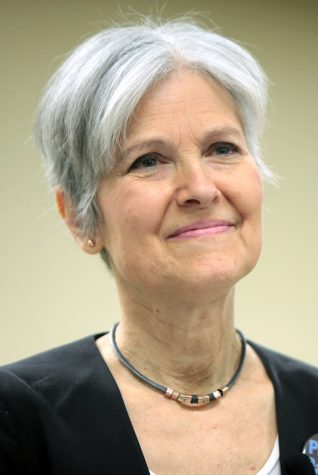Students support third-party candidates Johnson, Stein
Gary Johnson, the Libertarian candidate for president, speaks at a campaign event in Los Angeles on Oct. 19. (Marcus Yam/Los Angeles Times/TNS)
October 31, 2016
Though the press is flooding the American public with a sea of Hillary Clinton and Donald Trump, many voters are turning to support third-party candidates Gary Johnson and Jill Stein.
Throughout the history of the U. S., politics have been heavily influenced by the Democratic and Republican parties, but this election season is showing a growing support for the lesser-known Libertarian and Green parties. This support is especially prevalent among college-age voters.
Johnson is the Libertarian nominee and Stein is the Green party candidate.

Get The Daily Illini in your inbox!
“I used to be unaware that there were more than two parties,” said Sam Erickson, president of Illini Libertarians and junior in Engineering.
During the 2012 election, Erickson opted not to vote because he did not agree with the ideals of the nominees.
“After the 2012 elections, I researched other parties to find a group I agreed with. This led me to the Libertarian Party,” Erickson said. “I support many of Johnson’s values.”
Both the Illini Libertarians and Illini Young Green Party organizations were established this year and are growing in popularity among University students. The Illini Republicans and Illini Democrats have been established for numerous years.
“More people are choosing to vote for the third parties because Trump and Clinton are far right and left-wing and not moderate,” Erickson said. “People in their own parties dislike them, causing people to look more into other options.”
According to USA Today, third parties are drawing more support among the American people. In a recent survey, 76 percent of voters believed that Stein and Johnson should be allowed to debate in the televised presidential elections.
“In ideal world there would be no political parties,” said Mary Jane Oviatt, president of the Illini Young Green Party and junior in ACES. “Many people are uneducated and don’t have sources to get the info needed. In addition, many sources are biased, so a person must read numerous articles to completely understand.”
Oviatt said that voters need to educate themselves on the candidates to truly see who they stand with
“(A person should) know each person on the ballot. It is important to vote in support of your values instead of based on a party because they shift year-to-year.”
Despite third party votes, a majority of the voters support Clinton and Trump. Val Peterson, sophomore in LAS, said: “(The) two-party system makes so it’s hard for third parties to gain popularity. They’re based on a more specific set of beliefs and values than the two main parties and tend to lean more right or left because of that.”
Oviatt said that while her parents are conservative Republicans, she decided to find a party that fit her beliefs.
“When I was first understanding that I didn’t identify with them it was hard because we got into debates. Many people vote for who their parents want without questioning it,” she said.
Despite supporting different political parties, Oviatt said that she and her parents share many of the same values and political views.
Erickson introduced his friends and family to the Libertarian Party when they were struggling to support Clinton and Trump.
“My friends and family were complaining about the candidate options, so I introduced them to the party. There is not a lot of tension between my friends and family that identify with other parties, although debates can get heated,” he said.
Many voters are choosing to vote within the Democratic and Republican parties by voting for who they believe to be the lesser of two evils.
“A (voter) either hates Trump or Clinton a lot and thus votes for whichever one they like better, regardless of whether or not they support their values,” Erickson said.
Oviatt has noticed this increasingly popular trend.
“This has stemmed from years of ignorance,” she said. “People are disappointed from the government. I don’t want fear to drive my decision because that will lead to bad things.”
Erickson agreed: “I understand where people are coming from but I don’t agree with that mindset. It makes it harder for third parties to win the election.”
Both Erickson and Oviatt suggest that all voters should do more research on all the parties before stepping up to the ballot on Nov. 8.
“Choose news sources wisely by seeing who is funding them because they could be biased. Go on a candidate’s Facebook page and watch the debates. People must educate themselves,” Oviatt said.







